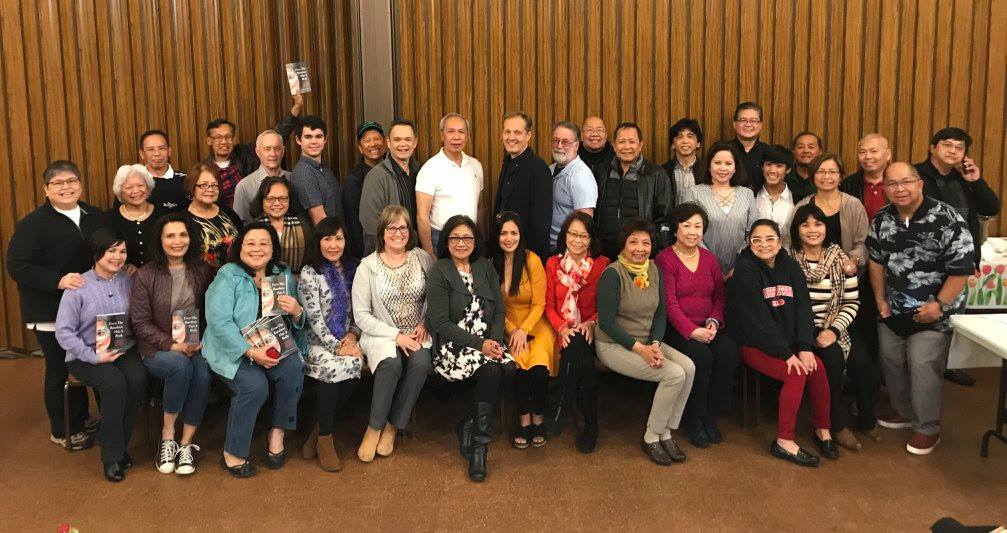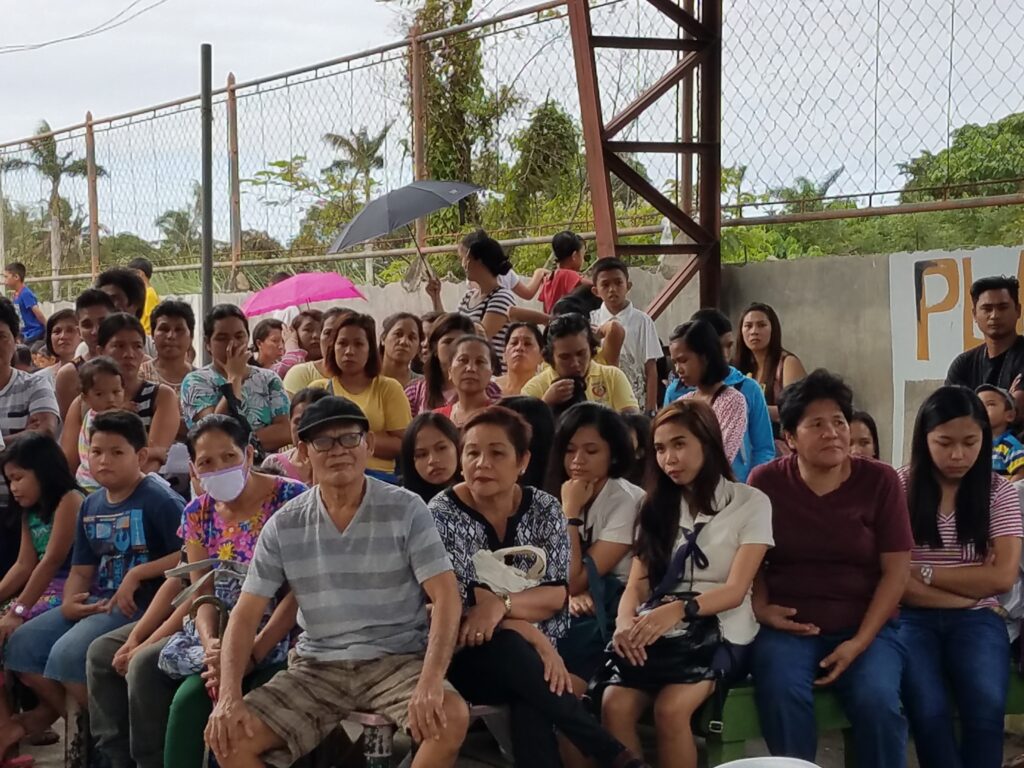“Religion begins in the sensation that your life makes sense within a larger one, that you and the animals have a bond, that the trees and rocks and rivers are to the body of the world as your bones and hair and bloodstream are to your body. You understand, at least in some primal way, that your happiness depends on the happiness of the beings around you. You may even realize that your soul participates in the world’s soul. One etymology of the word “religion,” re-ligare, to bind together, describes the bond between you and your world and ultimately with the hidden, invisible, yet pulsing, breathing, singing source of it all. You are part of that scene and have divinity flowing through you as well. You are what Nicholas of Cusa called deus humanus—a human-god or god-human. Paradoxically, without that divinity you have no humanity. – Thomas Moore, “A Religion of One’s Own,” 2014
SANTA BARBARA, ILOILO — Thomas Moore must have been a prescient witness to the 2018 medical mission by the Philippine Medical Society of Northern California (PMSNC) from January 22-26. It took place here in Santa Barbara, whose second-class municipality’s resources were planned for mobilization, with the help of Dr. Annie Hayag, a retired pediatrician from San Diego, California, and Dr. Marlene Cordero, from Atascadero, California, this year’s medical mission coordinator.

Santa Barbara, Iloilo is not yet a first-class city, but it is transitioning to become one, with its international airport which just opened, including a duty-free shop; mega-city developments by Global-Estate Resorts, a convention center, hotels and more; while its Western Visayas Sanitarium, its public hospital, is still in blueprint stages, for remodeling and renewals, right across an upscale development, called Santa Barbara Heights.

Though local structural resources fell short of what was needed, Cordero kept seeing what could be possible, perhaps because she has been a medical mission volunteer for 23 years and she coordinated this medical mission, complete with volunteers whom she personally knows.
Could it be the influence of her upbringing — two years of high school in Tabuk, Kalinga, exposed to the indigenous culture, which she found “invigorating to face the challenges from the forces of nature, celebrating whenever we can with singing and dancing, a unique culture where women were as equal as men,” as she recalled?
After five days, it would be ‘light-filled experiences’ for 5,283 patients, 175 volunteers answered the call to service, “39 physicians, two dentists, one optometrist, 54 nurses, nine allied health, 48 support & 22 student volunteers,” according to PMSNC’s website.
In surgery, while three rooms were promised, only one materialized on the first day. PMSNC’S medical personnel and volunteers spent the weekend cleaning the surgical room, with a full scrub down of all its walls; while others organized the medical supplies in another room. As days progressed, and with the greater need manifested, more surgical rooms were available.
With the help of Dr. Karen Francia, an ophthalmologist and president of the Western Visayas Ophthalmological Society, she secured the second hospital, Iloilo Doctors’ Hospital, to provide the medical mission with additional operating rooms for all the cataract surgeries. She even took an extra step of obtaining the necessary authorization from the Philippine Association of Ophthalmologists for eye surgeries.
The receiving portal for 5,283 patients to be triaged was in a partially covered gymnasium, and upstairs, the barangay health office where community education workshop was provided to manage chronic health conditions of diabetes, hypertension and other diseases of the aging population. In intense heat, the partially covered gymnasium could not provide adequate shelter to the patients and the families with children needing pediatric, respiratory treatments for asthma, and dental work.
It took Dr. Carmencita Abarquez-Agcaoili, outpatient director of PMSNC from California, who negotiated with a responsive local Mayor Dennis Superficial, M.D. (a surgeon), for tarps, huge electric fans and more lawn chairs to be provided for thousands in line, making Tuesday’s mission more organized.
Suffering existed on both sides, yet all were committed, to achieve, and to provide the highest possible level of medical care for 5,283 patients.
Imagine these patients’ resilience of enduring their pain, some a year and more for goiters and hernias, while medical volunteers endured long hours of work in intensely humid and hot weather (86 degrees Fahrenheit), made worse by cemented floors, oozing their accumulated heat, after sporadic rains.
Undeterred, these volunteer dentists, doctors, pediatricians, respiratory doctors, nurses, radiologists, biomedical engineers, residents, physician assistants and ophthalmologists worked with no fuss, set up what was required, including disinfecting stations for the dental department.
The ambulance had one seat for the driver, a torn passenger seat with sprung springs as if saluting the passenger who dared to sit down, along with a wood bench for the passengers to sit in the back. It had no stretcher or rescue equipment.
Even with this obvious lack, doctors and surgeons and nurses and allied health personnel rallied with cooperation and delivered their best efforts.
Two-hundred eight patients received surgery, which included, 40 for major (thyroidectomies, mastectomy, repairs of cleft palate, release of burn strictures, and herniorrhaphies), 139 minor and 49 ophthalmology procedures (39 cataract surgeries), as reported by Fred Acelar, who heads the IT department of PMSNC.
I witnessed volunteers approaching Cordero, some moved to tears by what they saw, with thousands needing medical care. Yet, she remained calm and resilient in problem-solving mode. She held their hands so to speak, and got them to reconnect with PMSNC’s mission.
Richard Samoranos, a first-time volunteer shared: “While on the mission, Dr. Marlene Cordero demonstrated exemplary leadership in the face of many challenges. She served as a model for me to keep focus and to commit to the mission’s mantra rather than letting my emotions cloud my judgments or competence. While shadowing the emergency room (ER), I encountered several stressful situations but it was Dr. Marlene Cordero’s leadership that kept me motivated and focused.”
Could it be that Cordero was drawing from her own teenage to adult development, “may bantay parati (I was always chaperoned), with limited exposure and then to experience social issues of having to stay in the dorm, nurtured by teachers and nuns?”
Teamwork to be proud of
Cordero recognized the volunteers: “Teamwork, I could not be more proud of,” at an Alameda-based appreciation lunch held in March 2018 at St. Albert’s parish hall.
One patient encountered a two-hour wait before she could be attached to the respirator; yet, the surgical team stayed to manually bag the patient to keep the oxygen supply going.
Cordero reported on the heroic efforts of a doctor who was going to catch a flight at 4 a.m., and stayed in the post-surgical recovery room with the patient and family, until 10 p.m., to see the patient recover.
Yet, one patient was lost, 15 days after the mission’s successful operation. That patient had a congenital heart condition that was not revealed, nor known before the operation. Somehow, someone snuck in solid food to feed this patient, who complained of hunger, creating post-surgical complications. Normally, after surgery, feeding is eased by IV, liquids, and not until after several days, solids. The patient passed away from his weak heart, 15 days after the mission.
The days of the mission always started with a prayer. Even the local folks complained about how the conditions were, compelling the locals themselves to provide bottled water to the medical mission volunteers. The locals also stopped the patients from coming in at 2 p.m., as it got too hot, while all were exposed to the sun and although receding, got more intense.
Ricky, a fourth generation Filipino-American, shared what the mission meant to him: “I felt instant connectivity to the land where my blood comes from. It is my first time to see the land, it was my first time to see blood, and it was my first time to travel internationally. I saw a patient who needed 800 cc. of blood. I was shadowing the family and I made the relationship with them primary. It strengthened my resolve to be a doctor, said a prayer for that patient, and to do better for myself.”
Another volunteer said, “This is a once in a lifetime opportunity by American doctors, used to having new technology. Now, it takes their smarts and creativity and will to help others, even without the technology.”
Dr. Carmelo Roco declared he will be a permanent volunteer, “We (his wife, his children came to the mission) will spend the money and time. What do I get? I become more humble, the way they live energizes me. It makes me more accepting as a person, to be content and happier with what I have, an energizing third factor. We all become better persons, and a better future perhaps. I worked with what I had. Patients were smiling and so appreciative. They trusted us, were relaxed, and looking to us to care for them.”
During the volunteers’ appreciation lunch this past March, which this writer traveled to go to Alameda, California, using her own funds, she witnessed PMSNC’s members recognize Cordero’s effective leadership, including the unseen burdens she shouldered on that required problem-solving as if no complications nor difficulties were happening.
Could it be that Cordero has been in active leadership positions, as chairs of California Department of Mental Health’s Psychopharmacology Advisory Committee; Atascadero State Hospital’s Department of Psychiatry, as president of PMSNC as well as its Executive Board Member, including founding President of Atascadero Performing Arts Center Committee and its member since 2003 to the present, while as founding president of the University Nueva Vizcaya’s Alumni Organization in 2015 to the present?
Who is this engaging Cordero?
To Anne Adorio, a two-year volunteer, “Dr. Marlene Cordero is simply not just an epitome of an inspiring leader and phenomenal mentor, but also a model of such in her own right. Many may say that it is premature for me to say this, as I have only known her for a couple of years. I must say though that a long time is not necessary to recognize what a beautiful person she is inside and out.
“During our medical missions in Dumaguete (2017) and Iloilo (2018), she auspiciously carried out her duties with integrity and candor. She earnestly communicated even last-minute information to ensure that missionaries were duly apprised. When some situations have taken a different turn, may it be big or small; she was responsibly forthright about it. Her kind, humble, genuine and gracious demeanor was a great tool in inspiring me to conclude even the hardest and longest workday with a modest heart. When complicated dilemma was brought to her attention, she instantly handled it with her quick wit, objective approach and reverential treatment. When immediate resolution was not available, she looked for possible solution or alternative.
“I must sincerely and deeply commend her for the compassion she has shown to me when I spoke with her about my desire to bring my two children to the mission. Being minors, I was not sure what certain parameters govern the ages of volunteers, but she accepted them with open mind, kind heart, and inspiring little talks. She managed to check on them in spite of her hectic schedule. This is truly an amazing trait of not only a well-accomplished physician and leader, but also a mother with utmost and genuine concern for the youth whom we all believe to be our future. It was because of this opportunity that my children solidified their long-term goal, and that is for Kristyl Plamenco to be a pediatrician and Kyle Plamenco to be a dentist some day. May this materialize or not, it does not really matter. What matters most is how instrumental she was to their lives… and mine. More power to her and may her life be more blessed. Hats off to you, Tita Marlene!”
Cordero is a woman of many firsts, resilient in many fronts (whether urban, rural, military and faith-based): Elementary to Second Year High School at St. Mary’s in Bayombong, Nueva Vizcaya; Valedictorian at St. Teresita’s High School in Tabuk, Kalinga-Apayao (where her father was assigned as district engineer); Cum-Laude and Dean’s Lister for her B.S. Pre-Medicine at U.S.T. in Manila; Benemeritus for her Doctor of Medicine Degree in UST;postgraduate training in psychiatry and neurology and obstetrics and gynecology at the Armed Forces of the Philippines Medical Center in Q.C. Philippines; rotating internship at Makati Medical Center in Makati, Philippines; and completed her residency in general psychiatry in Western Missouri Mental Health Center, affiliated with the University of Missouri in Kansas.
Today, she is a practicing psychiatrist in solo private practice, and a retired state psychiatrist who has served 28 years with the California Department of State Hospitals, and as a retired annuitant (she works for part of the year, as needed).
During the medical mission, she came with her husband, Dr. Reynaldo Cordero, a surgeon, who served as one of PMSNC’s former presidents. Together they have three children, Rex, Reynalene and Megan, who attended the volunteers’ appreciation lunch in Alameda.
How she balances to keep her family intact, her community, her volunteer work and her professional licensed practices active, is a testament to how she keeps God at the center of her life, but also, she consciously practices her Catholic religion, binding the invisible God’s Power with her visible brand of empathy with folks whom she meets and mentors.
Maya Angelou said in essence, people do not remember how many cars you drive nor the degrees you have, but they fully remember how you made them feel. With Cordero, as volunteers came to her and brought their personal and mission issues to be solved, it felt she heard them and they had a soft chair to fall on.
